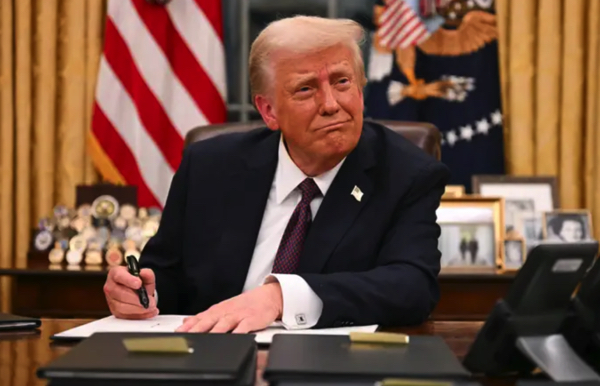 Parler
Parler Gab
Gab
- The Heritage Foundation’s Project Esther outlines a plan to combat pro-Palestinian activism on U.S. campuses, labeling it as "antisemitic and anti-American." The Trump administration has adopted its recommendations, sparking legal and ethical concerns.
- The administration has revoked visas (e.g., students at Tufts and Columbia), cut university funding (Harvard, Princeton, Columbia) and pressured schools to censor protests and expel activists. Measures include surveillance, doxxing and restricting academic departments.
- Civil liberties groups (ACLU, Jewish Voice for Peace) argue these actions violate free speech and academic freedom, framing criticism of Israel as "antisemitism." Courts have temporarily blocked deportations, while universities resist funding cuts.
- The crackdown has drawn international condemnation, with human rights groups warning of eroded academic freedoms and strained U.S. relations with allies. Critics fear a chilling effect on political discourse.
- The policies test the balance between national security, free speech and democracy. The outcome may reshape academic freedom, campus activism and U.S. policy on Israel-Palestine.
The genesis of Project Esther
Project Esther, released by the Heritage Foundation, is a 33-page document that outlines a comprehensive strategy to combat what it perceives as a growing threat from pro-Palestinian activism on American campuses. The document was quietly unveiled in October 2024, just months before the 2024 presidential election, and has since become a de facto playbook for the Trump administration's aggressive policies. The project's recommendations are rooted in a broader context of heightened tensions following Hamas' attack on Israel on October 7, 2023, which killed nearly 1,200 Israelis. This event galvanized pro-Israel groups, many of which are led by evangelical Christians, to push for more stringent measures against pro-Palestinian activism. The Heritage Foundation, a conservative think tank with close ties to the Trump administration, was well-positioned to provide a detailed roadmap for these efforts.Implementation of Project Esther
The Trump administration has adopted many of Project Esther's recommendations, including:- Visa revocations and deportations: The administration has revoked at least 300 visas from students, visitors and others, including Rümeysa Öztürk, a Turkish student at Tufts University, and two students from Columbia University, Mahmoud Khalil and Yunseo Chung. These actions have been met with legal challenges, but the administration has defended them as necessary to protect national security and combat antisemitism.
- University funding cuts: The Department of Education has suspended or canceled significant research grants to universities deemed to harbor pro-Palestinian activism. Princeton University lost 210 million in research grants, Columbia University had $400 million in funding canceled, and Harvard University is under review for over $9 billion in contracts and grants. These cuts are part of an ongoing investigation into alleged antisemitic discrimination and harassment on campus.
- Discrediting pro-Palestinian faculty and staff: The administration has sought to undermine the credibility of pro-Palestinian university faculty and staff, with the ultimate goal of revoking their credentials and affiliations with campuses. This has included increased scrutiny of academic freedom and the use of websites like Canary Mission, which is accused of doxxing critics of Israel, to identify and target individuals.
- Campus restrictions and surveillance: Universities are being pressured to implement stricter restrictions on protests and demonstrations, empower public safety officers to make arrests, and expel or suspend students involved in pro-Palestinian activism. Columbia University, for example, agreed to nine of the administration's demands, including strengthening protest restrictions and placing its Middle Eastern, South Asian and African studies department under independent control.
Legal and ethical concerns
The Trump administration's crackdown has faced significant legal and ethical challenges. Civil liberties groups, including the American Civil Liberties Union (ACLU) and Jewish Voice for Peace, have condemned the tactics as a violation of free speech and academic freedom. They argue that the administration is using the guise of combating antisemitism to silence legitimate political dissent. Kevin Rachlin, the Washington director at the Nexus Project, a left-leaning Jewish group, warned, "There is real danger if this is implemented. It undermines the principles of democracy and free speech that are fundamental to our society." The legal challenges have also highlighted the potential overreach of the administration's policies. Judges have temporarily blocked the government's deportation efforts in several cases, and universities are pushing back against the funding cuts and demands for increased surveillance.Global implications and future outlook
The Trump administration's actions have broader implications for the global discourse on Israel-Palestine and the balance between free speech and national security. The crackdown has drawn international attention, with human rights organizations and academic institutions around the world expressing concern over the erosion of academic freedom and the targeting of pro-Palestinian voices. The administration's aggressive stance has also strained relations with some of its traditional allies, particularly in the academic and civil liberties communities. The ongoing legal battles and public scrutiny may force the administration to reassess its approach, but the underlying tensions and ideological divides are likely to persist. The Trump administration's crackdown on pro-Palestinian activism, closely mirroring the recommendations of Project Esther, has ignited a fierce debate over the balance between combating antisemitism and protecting free speech and academic freedom. The outcome of this debate will have far-reaching consequences for the future of academic discourse and the broader political landscape in the United States. Sources include: InformationLiberation.com Politco.com APNews.comA struggle over energy future unfolds as developers defy executive order
By Willow Tohi // Share
Trump’s surprise role in Japan trade talks signals new economic order
By Cassie B. // Share
Greenland’s strategic tensions: A tug-of-war over sovereignty, strategy and alliance
By Willow Tohi // Share
Germany’s gold dilemma: Urgent calls to audit U.S.-held reserves amid political tensions
By Willow Tohi // Share
Governments continue to obscure COVID-19 vaccine data amid rising concerns over excess deaths
By patricklewis // Share
Tech giant Microsoft backs EXTINCTION with its support of carbon capture programs
By ramontomeydw // Share
Germany to resume arms exports to Israel despite repeated ceasefire violations
By isabelle // Share









